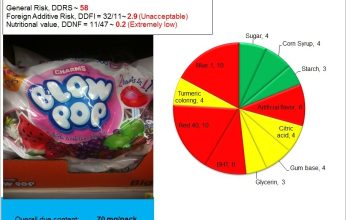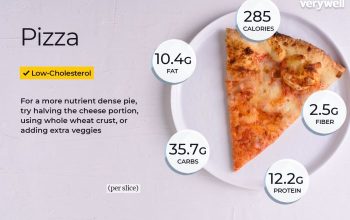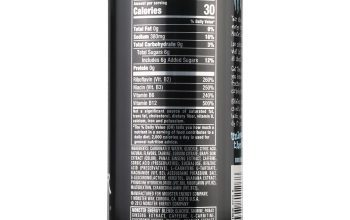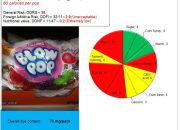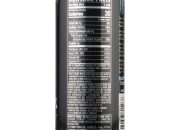Nutritional Content of Mountain Dew: Nutrition Facts Mt Dew
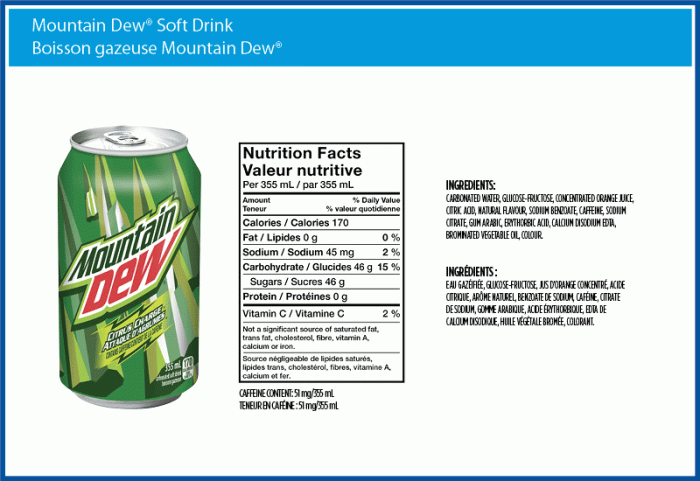
Nutrition facts mt dew – Mountain Dew, a popular citrus-flavored soft drink, is known for its high sugar content and distinctive, bold flavor. Understanding its nutritional profile is crucial for making informed choices about consumption. This section provides a detailed breakdown of the nutritional components found in a standard serving.
Nutritional Breakdown of a Standard Serving of Mountain Dew
A 12-ounce serving of Mountain Dew typically contains the following nutrients. Note that slight variations may exist depending on the specific formulation and manufacturing process.
| Name | Amount | Unit | % Daily Value |
|---|---|---|---|
| Calories | 170 | kcal | – |
| Total Carbohydrate | 46 | g | 15% |
| Sugars | 46 | g | – |
| Protein | 0 | g | 0% |
| Fat | 0 | g | 0% |
| Sodium | 15 | mg | 1% |
| Caffeine | 54 | mg | – |
Comparison to Other Popular Soft Drinks, Nutrition facts mt dew
Understanding how Mountain Dew’s nutritional profile stacks up against other popular soft drinks provides valuable context.
The following bullet points highlight key differences:
- Compared to Coca-Cola and Pepsi, Mountain Dew generally has a slightly higher caffeine content.
- While similar in total carbohydrate and sugar content to Coca-Cola and Pepsi, the specific sugar types may vary slightly.
- Diet versions of these sodas, including Diet Mountain Dew, significantly reduce sugar content by using artificial sweeteners, but may contain other additives.
- Some fruit-flavored drinks may contain fewer calories and less sugar, but often include added fruit juice or other sweeteners.
Impact of Ingredients on the Human Body
The high sugar content in Mountain Dew contributes to a rapid increase in blood glucose levels, potentially leading to energy crashes and contributing to weight gain if consumed regularly in excess. The caffeine content can provide a temporary energy boost and improve alertness but may also lead to anxiety, insomnia, and digestive issues in sensitive individuals. The artificial colors and flavors present in Mountain Dew are generally considered safe in moderation, but their long-term health effects are still under investigation.
Regular consumption of carbonated beverages, regardless of the specific brand, can contribute to dental erosion due to the acidity.
Understanding the nutrition facts of Mountain Dew, with its high sugar content, is crucial for mindful consumption. For a contrasting perspective on breakfast options, consider checking out the nutritional breakdown of a breakfast burrito; you can find detailed information on this at breakfast burrito nutrition facts. Returning to Mountain Dew, comparing its nutritional profile to a more balanced breakfast highlights the significant differences in sugar and overall nutrient content.
Government Regulations and Nutritional Labeling
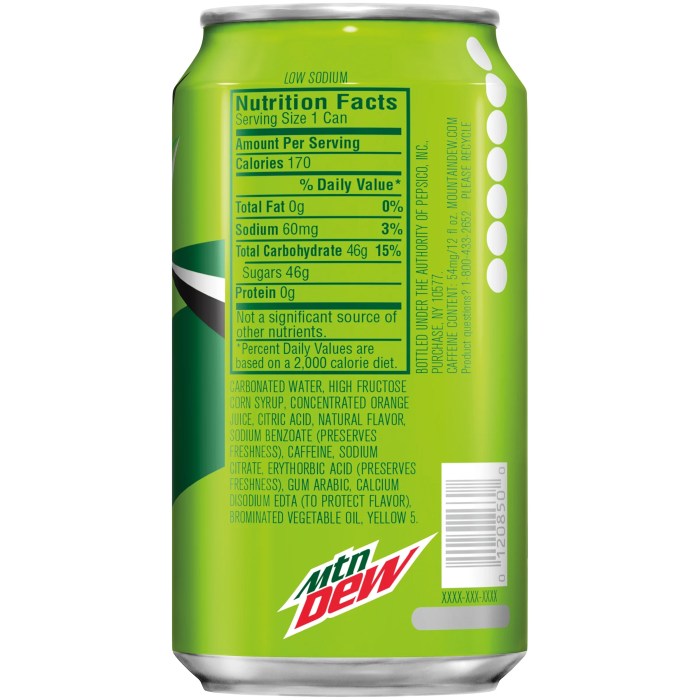
The nutritional labeling of beverages like Mountain Dew is governed by a complex web of regulations, primarily established by the U.S. Food and Drug Administration (FDA). These regulations aim to provide consumers with clear and consistent information about the nutritional content of the products they consume, facilitating informed choices and promoting public health. Compliance is mandatory for manufacturers, ensuring transparency and accountability.The FDA’s regulations dictate the specific components that must be included on the Nutrition Facts label, including serving size, calories, total fat, saturated fat, trans fat, cholesterol, sodium, total carbohydrate, dietary fiber, total sugars, added sugars, protein, and vitamin D, calcium, iron, and potassium.
These regulations specify the format, font size, and placement of this information, ensuring readability and easy comparison between different products. For soft drinks like Mountain Dew, the absence of significant amounts of certain nutrients (like protein or fiber) and the prominence of added sugars are clearly highlighted. This information is crucial for consumers to assess the beverage’s contribution to their daily caloric intake and sugar consumption.
Impact of Regulations on Consumer Information
These regulations significantly impact the information available to consumers. The standardized format ensures that consumers can readily compare the nutritional content of Mountain Dew with other beverages and foods. The prominent display of added sugar content, for instance, directly addresses public health concerns about excessive sugar consumption. The clear labeling of serving sizes helps consumers understand the amount of sugar and calories they are actually consuming per serving, rather than making assumptions based on the entire bottle’s content.
The impact is a more informed consumer base, better equipped to make choices aligned with their dietary needs and goals.
Effectiveness of Current Nutritional Labeling in Informing Consumer Choices
The effectiveness of current nutritional labeling in influencing consumer choices is a subject of ongoing debate. While the standardized format provides a baseline for comparison, some argue that the complexity of the information, particularly for those with limited nutritional literacy, can be overwhelming. Studies have shown mixed results regarding the extent to which consumers utilize nutrition labels to inform their purchasing decisions.
While many consumers do pay attention to calorie and sugar content, the impact on actual behavior change is often less significant. For example, while awareness of high sugar content in Mountain Dew might exist, consumer preference and other factors, such as taste and price, may override nutritional considerations in purchase decisions. The effectiveness of current labeling could be enhanced through simpler visual cues, clearer explanations of nutritional terms, or more prominent warnings regarding high sugar content.
User Queries
Is Mountain Dew caffeine-free?
No, Mountain Dew contains caffeine.
Does Mountain Dew contain artificial colors?
Yes, Mountain Dew typically contains artificial colors.
Are there different versions of Mountain Dew with varying nutritional content?
Yes, Mountain Dew offers various flavors and sometimes diet versions with altered sugar content.
How does Mountain Dew compare to other energy drinks?
The nutritional profile varies between energy drinks and Mountain Dew; comparing specific brands is necessary for a precise comparison.
What are the long-term dental effects of consuming Mountain Dew regularly?
Regular consumption of Mountain Dew can increase the risk of tooth decay due to its high sugar and acid content.

